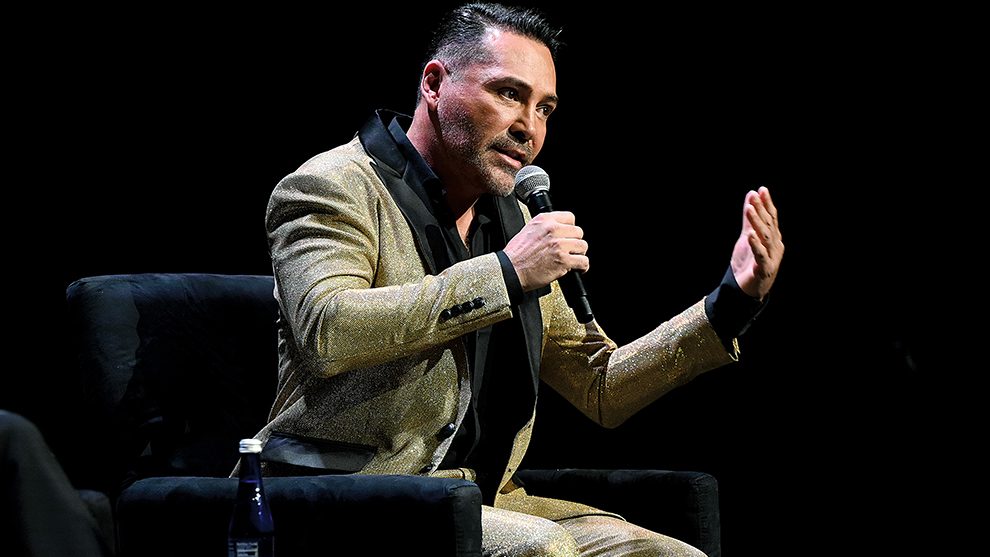On February 24, 2000, Oscar De La Hoya, known as The Golden Boy, sat at the press room podium at Madison Square Garden. He was set to headline a show against Derrell Coley in a couple of days. De La Hoya had recently suffered his first professional loss to Felix Trinidad, a controversial defeat by points. However, despite this loss, De La Hoya remained as popular as ever. The New York State Athletic Commissioner Mel Southard, who previously worked for the New York Yankees, compared De La Hoya to their iconic shortstop, Derek Jeter. Southard praised De La Hoya’s clean-cut image, similar to Jeter’s. De La Hoya, seemingly expressionless, had no idea who Jeter was until his promoter, Bob Arum, informed him of the compliment. De La Hoya then signaled a thumbs up to Southard.
The story of Oscar De La Hoya captured the hearts of many when he won the Olympic gold medal in 1992, fulfilling the dying wish of his mother in the process. From that point forward, De La Hoya became not just a boxing star but also a mainstream figure. Initially, he faced criticism, with some perceiving him as a privileged pretty boy receiving special treatment. However, De La Hoya made a point of taking on the best fighters and never avoiding a challenge. He consistently met the toughest opponents head-on, earning respect. While there were greater fighters in and around his era, none matched his willingness to face difficult opponents inside the ring. Outside the ring, however, De La Hoya sought any shortcuts he could find.
Recently, HBO aired a two-part series called The Golden Boy, portraying the present-day De La Hoya as he opened up about his struggles and inner demons. At 50 years old, De La Hoya still feels conflicted, describing the last 45 years as dark despite the world falling in love with his story. He revealed that the dying wish of his mother, which drove him to win the gold medal, had been a fabrication. Despite this, he embraced the lie and considered it harmless.
The perception over the years was that Oscar had a complicated relationship with his father, Joel, and struggled to win his approval. On the other hand, his mother was seen as a loving and sensitive figure. In reality, De La Hoya now reveals that his relationship with his mother was equally complicated. He shares a childhood memory of running into the street and ending up under a car, escaping without harm. Rather than comforting him, his mother hit him for being careless. This was not the first or last time she resorted to physical punishment out of anger. De La Hoya reflects on how he visualized his mother’s face on his opponents in the ring, using that anger as fuel.
Expanding on the complex relationship, De La Hoya discloses visiting his mother’s grave a few days after the 1992 Olympics to talk to her. However, he never had the courage to tell her that he loved her, something he deeply regrets. Perhaps his difficult relationship with his own parents made it challenging for him to be a good father himself. Years later, a scandalous picture of De La Hoya in a fishnet outfit and high heels became widely known. Concerned about the potential embarrassment for his children, he hired a forensic expert who claimed the photos were fake, allowing De La Hoya to avoid any consequences. However, he admits to being an absentee figure in his children’s lives, as they were born to different women. The fact that his children have turned out well reflects positively on their mothers, not him. In fact, the siblings did not meet until they were grown up, but they have formed a better relationship with each other than with their father.
De La Hoya acknowledges that being a father is a huge responsibility that he struggled with. Instead of knowing how to handle it, he turned to drinking, consuming alcohol between fights. He believed that money could solve everything, but he now regrets the pain he caused through his actions. Although there is reportedly a significant other in De La Hoya’s life at present, his past relationships have never lasted due to lies and deceit on his part. The allure of the nightlife and the perks it provided as a celebrity proved too tempting to prioritize a stable family environment. While he admits that he wasn’t happy being at home, it remains unclear if he has found happiness now. De La Hoya still craves the limelight and finds some satisfaction in his role as the head of Golden Boy Promotions. However, nothing compares to the fame and demand he experienced during his prime when he fought in major fights.
The timing of HBO’s airing of “Golden Boy” was peculiar, as it coincided with other significant boxing events. This resulted in less interest in the documentary compared to if it had premiered at a different time. Additionally, De La Hoya faced disturbing rape accusations, although no criminal charges were filed and a civil case was settled. De La Hoya vehemently denies such actions, attributing the accusations to his popularity and the desires of some women.
De La Hoya’s proud Mexican heritage made him an outsider when he faced the legendary Julio Cesar Chavez. This motivated him more than any other opponent. While he respects the Mexican culture, he takes pride in being born in the USA and felt the need to prove himself to a culture that initially viewed him as an outsider. The documentary showcases footage of De La Hoya’s two victories over Chavez, providing insight into his struggles for acceptance.
Source link
